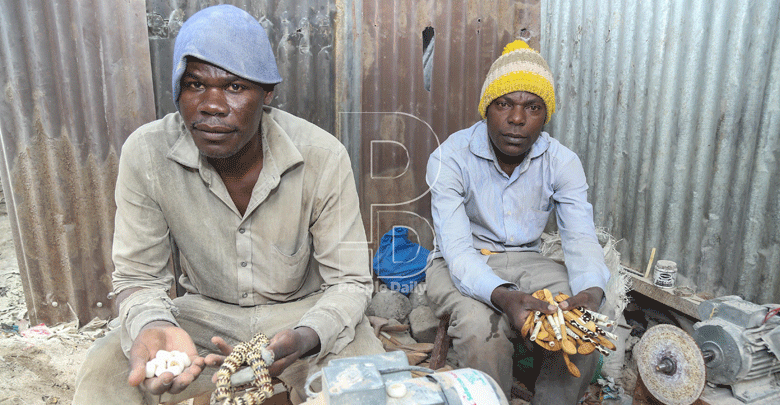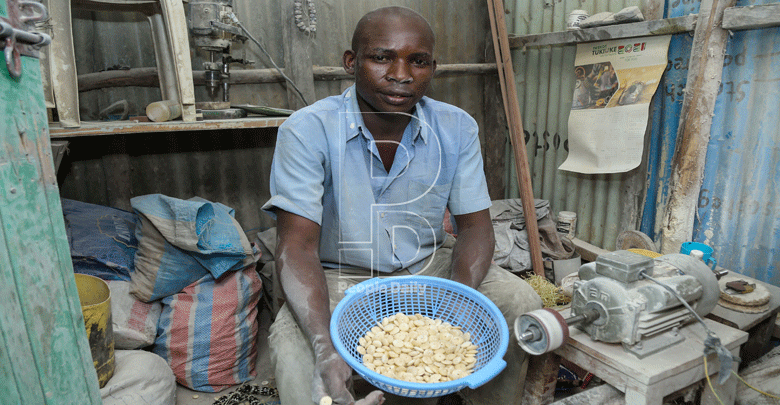Finding beauty in discarded bones, hooves
By Adalla Allan, June 28, 2021Adalla Allan @adalla_allan
Whenever Kibra is mentioned, many picture an impoverished community facing extreme poverty and high unemployment rates.
Against this background, a group of residents established a self-help group called Tenancy, based in Hawkers Place, Kibra, to change the narrative.
As a matter of creativity and caring for the environment, the team chose to collect animal bones from different areas in Nairobi and convert them to beads, bangles, necklaces, earrings and spoons.
Wycliffe Pete, the group chairman, says they formed the group to create employment and to conserve the habitat by converting trash into treasure. Pete got into this industry 20 years ago and has never looked back.
“After unsuccessfully searching for a job for years after completing my high school education, I had to think out of the box.
I got these ornament-making skills from a friend, and when I realised I was able to do it on my own, I decided to establish my own place here in Kibra,” he says.
According to scientists, bones decay at a slower rate than other organic materials.
Depending on the conditions, this process usually takes years and the group looked for ways of making good use of the piling bones butchers and meat joints in the city discarded as waste.
Mostly, they use bones from domestic animals, such as goats, cattle, sheep or poultry.
“With time, I realised this skill, which I had taught many people in Kibra, would be able to solve the rising rates of unemployment.
In 2010 we found the Tenancy Self Help Group to unite all those people working in this sector in Kibra,” he says. The group has since grown and currently registered over 50 members.
Samuel Owiti, a member who joined the group in 2004, has been able to raise his children and cater for their education through the craft.
A specialist in making beads and necklaces, he explains the process it takes.

“After the bones are cut, sharpened and smoothened, they are boiled using hydrogen peroxide to remove fat stuck on them for easier painting.
Candle wax is then applied to the boiled bones to maintain the ivory colour while other parts turn black when the bones are dyed.
Afterwards, the bones are put in a container filled with dye for some time to allow them maintain the artistic and durable shade,” he explains.
They did all this using manual hand drills in a process that he describes as tiresome and time-consuming.
Fortunately, they received four jewellery-cutting machines from giant mobile network company, Safaricom through the Ndoto Zetu initiative. The new machines are high speed, thus enhancing their production.
Angeline Atieno, a mother of four and widow, has been the breadwinner of her family through this job, which she started 10 years ago.
“I always believe in hard work. I pay school fees and make sure my children do not go without a meal,” she reveals.
Kennedy Ainga, a father of four who dropped out of school in Form Two, left Kisumu for Nairobi hoping to change his and his family’s life fortunes.
After a long struggle of looking for a job, a friend introduced him to the craft in 2001.
Like any other industry, he says they have been facing a challenge in marketing. With the pandemic striking hard on all businesses, theirs was not spared.
“We depend on tourists from abroad, but the measures put up by the government to combat the pandemic have adversely affected the business. We are also facing challenges in terms of the market.
The middlemen that market our products are sometimes unfair. They buy from us at lower prices, and overprice the items when selling to tourists,” he says.
In the next five years, Pete says they expect to grow their stock by collecting bones outside Nairobi a to solve the scarcity of these raw materials.
They are also determined to export their products and have showrooms to showcase their products and to avoid use of middlemen.
“Everybody has a skill, it is just a matter of practicing. They should come and join us to help conserve the environment by making good use of bones. Perhaps they have skills that they have never discovered,” Pete says.
